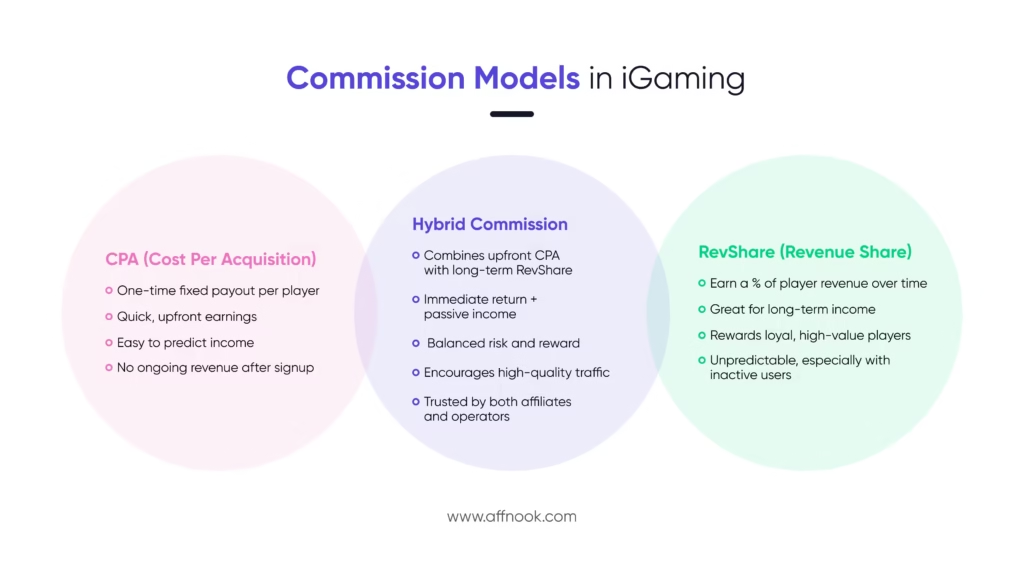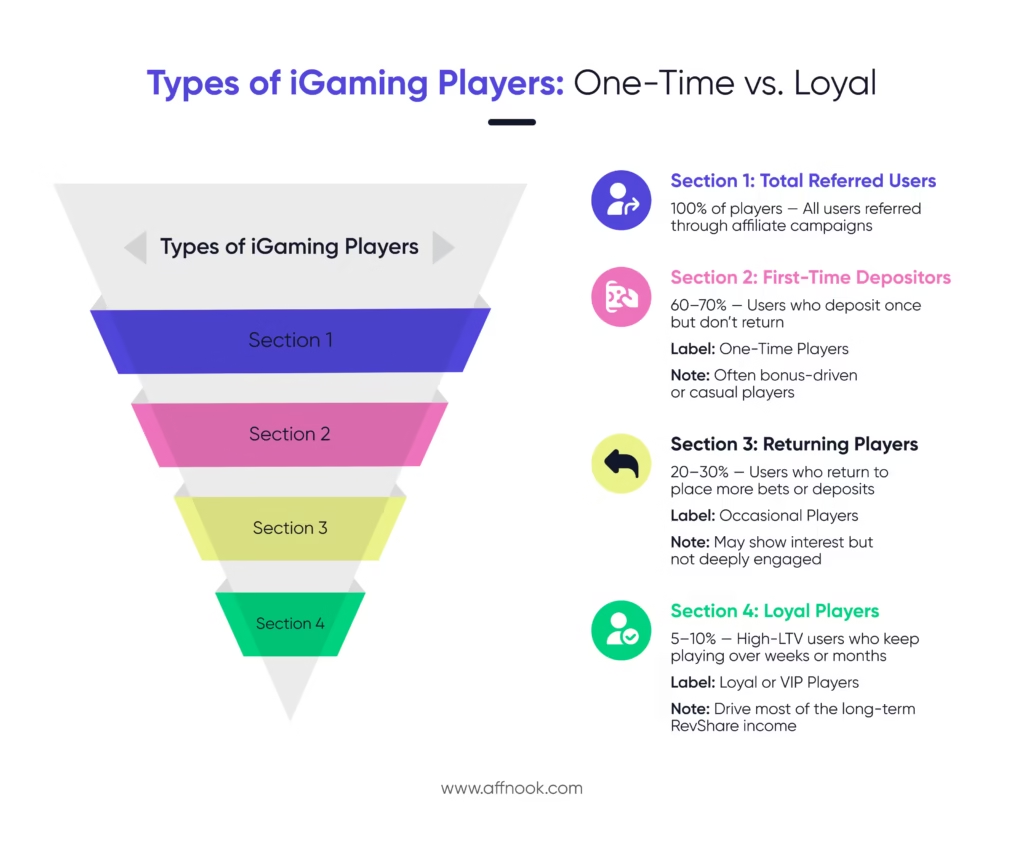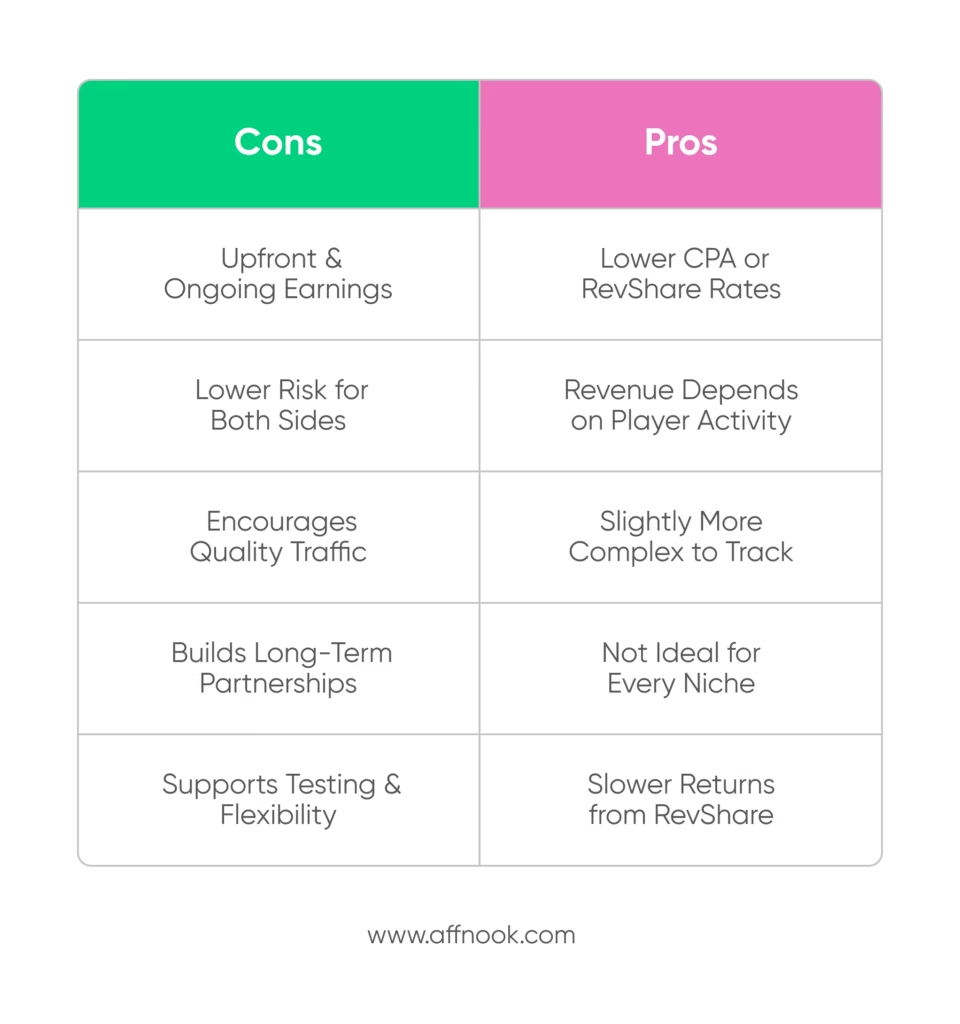Do you want to earn immediate returns from your affiliate efforts while continuing to generate income over time?
If you are working in the iGaming world, balancing this income strategy is your top priority. And if you are relying solely on one commission model, it could limit your earning potential, especially when working in an industry where player acquisition and lifetime value are key factors.
That’s where this commission structure comes in. It combines the benefits of CPA (cost per acquisition) with the recurring income of Revenue Share, giving you the flexibility to earn both short-term and long-term rewards from every referral.
In this glossary article, you will learn more about the commission model, how it works in the iGaming industry, and why it has become a preferred model for affiliates and operators.
What is a Hybrid Commission Structure?
This model is a combination of two popular affiliate payment structures that are Cost Per Acquisition (CPA) and Revenue Share (RevShare). Rather than picking between a one-time payout or ongoing earnings from player activity, you get the benefit of both in a single deal.
Let’s understand how it works in real life
Imagine you sign a deal with an iGaming platform that offers:
- $50 CPA – for every player you refer who signs up and makes a deposit
- 15% RevShare – from whatever that player spends or loses over time
So, when you bring in a player, you earn $50 right away. But it doesn’t stop there. If that player keeps coming back to play (as many loyal users do), you continue to earn 15% of their net revenue every month.

Why Does it Work So Well in iGaming
If you are promoting a sportsbook, an online casino, slots game, or poker room, you already know that this industry is highly competitive, highly valued, and fast-moving. So, understanding players in the space is so unpredictable, like one player might deposit once and then vanish, while another player can stick around for a month and generate consistent revenue.
Here’s a clear breakdown of why the hybrid commission structure works so well.
1. Unpredictable Player Behaviour
In iGaming, all players are not the same; some are casual players who make a single deposit and never come back, and others are high-value players who wager on a daily basis. So, for the iGaming affiliates, it is very hard to manage their earnings.
So, with the help of the CPA model, you only get a fixed payment for each player you bring, no matter how much that player ends up spending. So even if someone becomes a high-value player, you don’t earn anything extra.
And with RevShare, you earn a percentage of what the player spends over time. That’s great if the player stays active, but it’s risky if most of your referrals leave early.
2. iGaming Players often have High Lifetime Value (LTV)
Online casino players can have a lifetime value (LTV) ranging anywhere from $500 to over $1,500, depending on the region and platform. That’s a huge earning opportunity.
With a CPA-only deal, you’re just getting a small, one-time payout, often a fraction of the player’s full value.
But with a hybrid commission structure, you unlock more of that potential. Even if the CPA portion is lower, the ongoing RevShare can significantly boost your income over time, especially when you’re bringing in loyal, high-value players.
3. It Encourages Quality over Quantity
In iGaming, it is not about getting more clicks; it is about sending quality traffic. With a CPA model, there’s a risk of chasing quick wins, like users who sign up just for a bonus and never come back.
But a hybrid commission model allows you to focus on real and active players. The more they play, the more they earn. So it makes sense to aim for quality over volume.
This not only increases your earnings over time but also builds trust with the brands you work with.
4. It Aligns Incentives Between You and the Brand
The best affiliate programs are built on mutual benefit. You want to get paid fairly for your effort. Brands want high-quality, loyal players.
Hybrid deals help align your goals with theirs:
- You’re rewarded upfront, so your risk is reduced
- The brand gets a chance to recover CPA costs through player activity
- If your traffic is good, you’re both winning more over time
That’s why more and more iGaming operators are adopting hybrid as their default offer.
5. More Flexibility When You’re Testing Channels or Markets
Let’s say you’re trying out a new traffic channel like TikTok, SEO, or influencer marketing, or entering a new region like LATAM or Europe.
You don’t yet know how well your traffic will perform long term.
Hybrid lets you:
- Get quick feedback on how many users are converting (thanks to CPA)
- Track long-term value as your campaign matures (through RevShare)
It acts like a safety net and a growth tool at the same time.

Why iGaming Brands Offer Hybrid Deals
As we know, not all affiliates are bringing the same traffic. Some affiliates bring high-quality players who deposit regularly and play. Others may send low-value traffic, like bonus hunters or users who disappear after one deposit. or cases of bonus abuse fraud, where players exploit promotions without real intent to stay active.
That’s why iGaming brands often choose hybrid commission structures. This model helps them protect their budget while still keeping affiliates motivated.
Let’s break down why this makes so much sense for operators:
Reduces Risk from Fraud or Low-Quality CPA Traffic
In a CPA-only deal, brands pay a fixed amount for every player, no matter what that player does afterward. So if affiliates send fake signups, one-time depositors, or users trying to abuse bonuses, the brand still loses money.
With a hybrid model, the CPA portion is smaller, and a big part of the affiliate’s earnings depends on whether the player stays active. That reduces the risk of paying too much for low-value traffic.
Makes It Easier to Measure Long-Term Affiliate Performance
RevShare gives brands insights into how valuable each affiliate really is. Instead of just counting signups, they can track how much revenue those users generate over time.
This helps them:
- Identify which affiliates bring loyal players
- Spot traffic sources with the best return on investment (ROI)
- Optimize their affiliate program based on real performance
Builds Stronger, Long-Term Affiliate Relationships
When affiliates earn from both CPA and RevShare, they have a reason to stick with a brand longer and focus on delivering better results.
Brands benefit too, because when affiliates are motivated to send quality traffic, it leads to:
- Higher player retention
- More revenue over time
- A more stable and trustworthy affiliate network
Pros and Cons of Hybrid Commission Structure

Why Affiliates and Operators Prefer the Hybrid Model
The hybrid commission structure is becoming more popular because it gives both quick payouts and ongoing earnings. It helps solve common problems for both affiliates and iGaming brands, making the partnership more fair and dependable.
For Affiliates –
Quick Payouts + Passive Income:
You get a CPA payment upfront, which helps with cash flow, and you continue earning through RevShare as long as your referred players stay active.
Reduced Risk, More Stability
Even if a player doesn’t stay long, the CPA still gives you a return. If they do stay, your RevShare grows, so you’re covered either way.
Scalable Revenue Model
As your traffic quality improves and more loyal users join, your RevShare increases, building a steady income stream over time.
For Operators:
More Control Over Spending
With a smaller CPA and added RevShare, operators avoid wasting money on players who sign up but don’t stick around.
Better Quality Players
Affiliates focus on bringing in real, engaged users instead of bonus hunters. This improves player loyalty and activity.
Pay Based on Real Results
With RevShare, operators only pay more when players generate revenue, making every payout tied to real performance.
Stronger Relationships with Affiliates
Because affiliates keep earning over time, they stay loyal to the brand. This leads to more stable, long-term partnerships.
Conclusion
The hybrid commission structure has become a very popular model in the iGaming industry because it combines the two payment models, CPA and revenue sharing. So it allows affiliates to earn a fixed amount for each new player while also gaining a share of the revenue that player generates over time.
For operators, it ensures better quality traffic, reduced financial risk, and stronger, long-lasting partnerships with trusted affiliates.
As the iGaming market grows more competitive, the hybrid model stands out as a flexible and performance-driven approach that benefits everyone involved. Whether you’re promoting a new campaign or scaling an existing one, understanding and using hybrid commission deals can give you a strong advantage.
Help Section
1. What is a hybrid commission structure in affiliate marketing?
A hybrid commission structure is a payout model that combines two types of affiliate compensation: Cost Per Acquisition (CPA) and Revenue Share (RevShare). Affiliates earn an upfront payment for each qualified user they refer (CPA), plus a percentage of the player’s net revenue over time (RevShare). It’s commonly used in the iGaming industry to offer both immediate rewards and long-term earning potential, making it attractive for both affiliates and operators.
2. How does a hybrid commission structure benefit iGaming operators and affiliates?
The hybrid model offers mutual benefits:
For operators: It reduces the risk of overpaying for low-value traffic and helps build sustainable relationships with affiliates. This structure creates a performance-driven partnership, aligning both parties’ interests for user retention and value.
For affiliates: It provides upfront income through CPA while ensuring long-term passive revenue from loyal players.
3. When should iGaming brands use a hybrid commission model over pure CPA or RevShare?
iGaming brands should consider using a hybrid commission model when:
They’re expanding into high-competition GEOs like the UK, Canada, or Germany, where affiliates expect better compensation terms.
It’s also ideal for mid- to high-volume affiliates who bring quality traffic but also want upfront cash flow.
They are testing new affiliate partnerships and want to balance cost and reward.
They want to incentivize affiliates to focus on both acquisition and retention.
4. What percentage and CPA rates are common in hybrid commission structures in 2025?
While rates vary by operator and region, typical hybrid deals in the iGaming industry in 2025 offer:
RevShare between 20% and 40% of net gaming revenue
For example, an affiliate might earn a $100 CPA + 25% RevShare, allowing them to benefit from both immediate and recurring earnings. GEO-specific factors and user quality often influence the final rates.
CPA payments ranging from $50 to $150 per qualified player
5. Are hybrid commission structures compliant with gambling regulations worldwide?
Yes, hybrid commission structures are compliant as long as the affiliate program and operator are licensed and follow jurisdiction-specific rules. However:
In countries like Australia or Germany, strict advertising and transparency laws apply.
Operators must ensure their hybrid agreements meet local compliance standards to avoid regulatory penalties or brand risk.
In the UK, affiliates must disclose payment models and avoid incentivizing risky behavior.
In the US, only licensed sportsbooks in regulated states can offer affiliate commissions.




